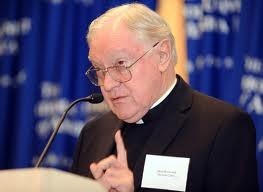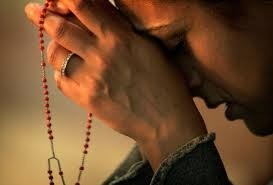What one bishop’s “apology” really means

Yesterday, one of the country’s most prominent religious leaders apologized for his role in the victimization of hundreds of children who fell prey to pedophile priests under his supervision.
Except his apology was not really an apology at all. Here’s what Los Angeles Archdiocese Bishop Thomas J. Curry actually said:
“I wish to acknowledge and apologize for those instances when I made decisions regarding the treatment and disposition of clergy accused of sexual abuse that in retrospect appear inadequate or mistaken.” Curry added, “Like many others, I have come to a clearer understanding over the years of the causes and treatment of sexual abuse, and I have fully implemented in my pastoral region the archdiocese’s policies and procedures for reporting abuse, screening those who supervise children and abuse prevention training for adults and children.”

Bishop Thomas J. Curry
Let’s be clear: Anyone raised in the Catholic Church—much less a 70-year-old bishop such as Curry—knows full well what it means to be contrite. In fact, deeply felt and expressed contrition, is a requirement for Catholics who have committed what the church calls “mortal sins.” (Mortal sins being violations that are so egregious that the violator has broken with God.)
Curry’s statement is not an apology. It’s a defense, one that he is putting forth now, as he faces a lawsuit representing hundreds of victims and one that will ultimately lead to the release of documents that pertain to the actions of nearly 90 priests.
When you strip away the attorney-approved language from Curry’s statement, what the bishop really said was, “I didn’t know any better.” And despite his powerful position as advisor to the archbishop of the largest archdiocese in the nation, Curry indicated that he was simply “like many others.” In other words, anyone else in his situation would have done the same thing. I am not guilty.
The statement is disgraceful and disrespects the victims of pedophile priests everywhere. Documents that have recently come to light reveal communications Curry had with his archbishop, in which they discussed ways to conceal cases of molestation from law enforcement. One particular case involves a priest who admitted to sexually abusing 13 boys during his 36 years in the Los Angeles archdiocese. Yet, rather than reporting the man to police, Curry said he should be sent to “a lawyer who is also a psychiatrist,” thereby putting “the reports under the protection of privilege.”
It is doubtful Curry or the archbishop will face criminal charges, as the revelation of the documents occurred decades past the three-year statute of limitations for felonies that would apply here, so Curry is most likely concerned about how his statements might have affected the lawsuit. But I venture that Curry’s carefully chosen words reveal another reason for protecting these men
 Under canon law, Curry would not have been found to have done anything that awful. You see, while Catholics must confess, show contrition, and pay penance when they have committed a mortal sin, are not considered to have committed a “mortal sin,” that’s only in cases when the individual knew what they were doing was wrong but did it anyway. Those who were not aware they were committing a grave act at the time—or, perhaps, as Curry put it, lacked “a clear understanding” of the seriousness of the situation—are not required to confess, act contrite, or pay penance.
Under canon law, Curry would not have been found to have done anything that awful. You see, while Catholics must confess, show contrition, and pay penance when they have committed a mortal sin, are not considered to have committed a “mortal sin,” that’s only in cases when the individual knew what they were doing was wrong but did it anyway. Those who were not aware they were committing a grave act at the time—or, perhaps, as Curry put it, lacked “a clear understanding” of the seriousness of the situation—are not required to confess, act contrite, or pay penance.
In other words, such ignorance gets one off the hook, as the individual has not committed a mortal sin, in the eyes of the church.
Do ethics or secular law offer any guidance to men like Curry? Probably not. If he is like many other Catholic officials, he would primarily allow canon law to determine whether or not he did anything wrong. So, Curry might verily believe that he doesn’t have anything to apologize for. Pope Benedict XVI highlighted this perception in a 2001 letter he cowrote. Back then, he was named Cardinal Joseph Ratzinger and headed the Congregation for the Doctrine of Faith—the office that decided untold numbers of clergy sexual abuse cases. Ratzinger wrote: “The functions of judge, promoter of justice, notary and legal representative can validly be performed for these [child sexual abuse] cases only by priests.”
So, in other words, damn secular law, damn society’s code of ethics, and damn the lives of child victims who would have sought healing and comfort from the words of a man who was largely responsible for their pain.
Let’s hope that the light being shown on cases such as Bishop Curry’s will make it harder for Catholic officials to come up with excuses as to why they protected the pedophiles, instead of their victims.



